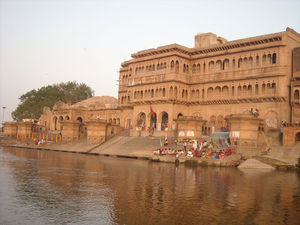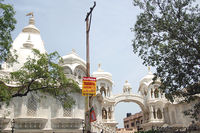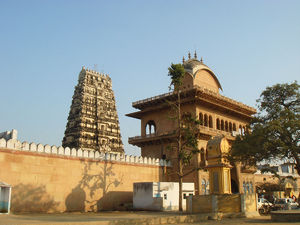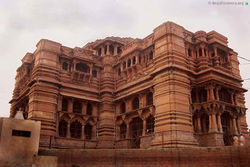Vrindavan is a town in the Mathura district of Uttar Pradesh, India. Vrindavan is located at 27.58°N 77.7°E, It is about 15 km away from Mathura, the city of Lord Krishna's birthplace.Vrindavan is the site of an ancient forest which is the region where Lord Krishna spent his childhood days.
|
Braj is like the ocean, Mathura like the lotus, and Vrindavan like the nectar-pollen. All the Braj gopis are like flowers, and Gokulchand Krishna is the bumblebee." |
This supremely charming forest known as Vrindavan is expertly served by Shri Vrinda Devi and is densely filled with many types of seva kunjas and keli-kunjas. Vrinda Devi eternally resides here, and is the protector, nourisher and forest goddess (vana-devi) of Vrindavan. All the trees, creepers, birds and animals of Vrindavan are under her jurisdiction, and they are dependent upon and obedient to her. She constantly engages countless gopis in service in the kunjas, and she is therefore the presiding deity of kunja-seva. It is important to understand Yogmaya (the collective internal energy of the Supreme Lord – samastibhuta svarupa-Sakti), Paurnamasi (the potency behind all of Krishna's pastimes – parakhya maha-Shakti) and Vrinda Devi, as well as their respective functions. Bhagvati Paurnamasi is the pastime incarnation of Yogmaya; which means that when Yogmaya takes a tangible form, she becomes Paurnamasi. Paurnamasi's function is to attend to all the details of the various pastimes in the forests and in the villages of the cow herders. Vrinda Devi, on the other hand, who is the personification of Shri Krishna's lilakhya maha-shakti (His pastime potency) and also a manifestation of Yogmaya, makes all the arrangements for Radha and Krishna's confidential pastimes in the kunjas, and for rasa-vilasa and so on.
|
Introduction |
Vrinda Devi's father is Chandrabhanu, her mother is Phullara Gopi and her husband is Mahipal. All of them eternally reside in Vrindavan. Vrinda Devi is the most important among all the sakhi messengers, such as Vrindarika, Meta and Murali. Her function is to skilfully arrange the meeting of the Divine Couple through various means and, therefore, she is the vana-devi of Vrindavan. Vrinda Devi has dedicated her kingdom of Vrindavan, which she wonderfully serves, protects and nourishes, at the lotus feet of Vrishabhanu-nandini Radhika, who is the embodiment of mahabhava. Therefore, Radhika is truly Vrindavanesvari, the Queen of Vrindavan.
The Puranas state that Maharaja Kedar's daughter, who is described as Vrinda Devi; King Kushadhvaja's daughter, whom the Brahma-vaivarta Purana describes as Tulsi, the wife of Sankhachuda; and Vrinda, or Tulsi, the beloved of Hari who appears in the form of a plant on the Earth planet; are ansa, prakasha, and kala-svarupa of Vrinda Devi, who is a direct expansion of the personal form (kaya-vyuha svarupa) of sarva-saktimayi Radhika. Vrinda Devi eternally resides in Vrindavan, and she is continuously engaged in service to the Divine Couple in the nikunjas of Vrindavan. Indeed, Vrindavan is known by the name of this Vrinda Devi. Descriptions of the abundant glories of Shri Vrindavan are found throughout Shrimad Bhagavata, which is the crown jewel of all evidences (pramanas). Shri Nand Baba's minister and elder brother Shri Upanand says:[1]
"We should not stay in this Gokul-Mahavan which is constantly in turmoil. As gopas and gopis, our prime duty is to immediately take up residence in Vrindavan, whose charm is unrivalled, being enchanting in every respect. It is covered with lush grass, beautified with various trees, creepers and sacred mountains, and protected in all respects to provide safety to cows and other animals."
Upon observing the wonderful, sweet pastimes of Shri Krishna, Chaturmukha Brahma became very astonished and prayed with folded hands:[2]
"It would be my great good fortune to take birth as a blade of grass, a shrub or any other species which can be anointed with the dust falling from the lotus feet of any of the Brajavasis of Vrindavan. Even the Shrutis, who have been searching for so long, have not yet received the dust of the lotus feet of the Supreme Lord Mukund, who is the life and soul of these Brajavasis. If it is impossible for me to take birth in any species in Vrindavan, then let me take birth even as a rock on the border of Nand-Gokul. The ladies who sweep the streets will then rub their feet on this rock to clean them, and by this I will receive the good fortune of touching the dust of their feet."
Uddhav, who is the highest among the five kinds of devotees (a prematura bhakta), prays:[3]
"I would consider it my greatest fortune to take birth as a shrub, creeper, or any other plant in this Vrindavan and thus be sprinkled by the foot dust of these gopis. They have given up everything, including their husbands, sons and other family members, the path of chastity (Arya-dharm), and their honour in society, which are all very difficult to renounce. Thus their prema has enchanted even the Supreme Lord Brajendra-nandan Shri Krishna, who is searched for by the Shrutis."
The beautiful young women of Mathura present in Kansa's wrestling arena lavishly praised Vrindavan by saying:[4]
"Ah, in all three worlds, only Shri Vrindavan and the gopa-ramanis living in Vrindavan are fortunate, because in that place the original Supreme Person, Shri Krishna, disguised as a human being, performs human-like pastimes under the arrangement of Yogmaya. Adorned with a multi-coloured garland of forest-flowers, He grazes the cows with Baldev and the sakhas, vibrating His sweet flute and absorbed in various kinds of playful pastimes."
Being intoxicated by Krishna-prema, one gopi addresses another gopi, saying:[5]
" O sakhi, this Vrindavan is spreading the fame of the Earth planet even above that of Vaikuntha, because it is splendidly decorated with the marks of the lotus feet of Yashoda nandan Shri Krishna. Friend, when rasikendra Shri Krishna plays on His flute, which enchants the whole world, the peacocks become intoxicated and, thinking the sound of the flute to be the roaring thunder of the clouds, spread their tail feathers and begin to dance. Seeing this, the birds and animals roaming on the mountain summits become completely stunned and relish the sound of the flute with their ears and the dance of the peacocks with their eyes."
What to speak of others, even the supremely rasika and bhavuka Sukhadev Goswami is mesmerised by Vrindavan, and repeatedly praises this land:[6]
"Shri Krishna, the enchanter of the whole world, dressed as the best of dancers, entered the supremely charming Vrindavan, beautifying it with the marks of His lotus feet. His head was decorated with a peacock feather. He wore fragrant yellow karnikara flowers behind His ears, a radiant golden garment on His dark-complexioned limbs, and around His neck a garland of forest flowers made of five different coloured flowers, that extended down to His lotus feet. He poured the nectar from His lips through the holes of His flute, enchanting everyone by its sweet sound, including both moveable and immovable entities. The cowherd boys followed Him, singing His glories."
Shri Krishna never leaves this sweet Vrindavan, which is inundated with the rasa of complete transcendental bliss.
Vrindavanm parityajya padamekam na gachchhati (Brahma-yamala).
One rasika devotee poet extracted the essence of the Shrutis and Puranas in regard to Vrindavan. As if putting the vast ocean into a water pot, he summed it up accurately by saying:[7]
"Braj is like the ocean, Mathura like the lotus, and Vrindavan like the nectar-pollen. All the Braj gopis are like flowers, and Gokulchand Krishna is the bumblebee."
The Magnificence of Vrindavan
Shri Vrindavan is not merely a sacred place (tirtha), but is Bhagvan's own abode, or His own home. It is no exaggeration to say that Vrindavan is Shri Krishna's form because Krishna and His abode are non-different. According to the Puranas, Devrishi Narad was once singing the glories of Shri Hari on his viva when he reached Prayag. This Prayag is Tirtharaja, or the king of all sacred places. Prayag welcomed him with great honour and narrated the story of how he became Tirtharaja. Shri Narad said, "The Supreme Lord has given you the post of Tirtharaja, but I have some doubt in this regard. Does Vrindavan ever come to make offerings to you like the other tirthas?" Tirtharaja replied, "No." Shri Narad asked, "Then, what kind of Tirtharaja are you?" This statement pierced the heart of Tirtharaja, but he under-stood it to be true. "How, then, am I Tirtharaja?" he wondered. Thinking in this way, he went to the Supreme Lord. Seeing Tirtharaja approaching, Bhagvan honoured him appropriately and asked him why he had come. Tirtharaja humbly replied, "Prabhu, You have appointed me as Tirtharaja, but the tirtha of Vrindavan never comes to make any offering to me. How can it be that I am Tirtharaja? If a small tirtha like Vrindavan does not accept my jurisdiction, then it is not at all appropriate for me to hold the title of Tirtharaja." Upon hearing the statements of Prayag Raja, Bhagvan became silent for a moment. His eyes brimmed with tears as He remembered Braj – cow grazing with His sakhas, the affection of Nand Baba and Mother Yashoda, His beloved Kishori Shri Radha, the gopis and His rasa dance with them – these memories appeared in His heart along with many others from Braj. Bhagvan's heart melted. After composing Himself a little, He spoke very gravely. "Tirtharaja, it is true that I have appointed you the king of all tirthas, but I have not made you the king of My own home, Shri Vrindavan. The land of Vrindavan is not only My home, but is the supreme place of My beloved Shri Radha's pastimes. She is indeed the mistress (adhipati) and sovereign (isswari) there. She is truly Vrindavaneshwari, the Queen of Vrindavan. I also reside there eternally. You are Tirtharaja, no doubt, but Vrindavan is not merely a tirtha. You too can worship and serve Vrindavan in some way." Shri Narad has glorified Shri Vrindavan not only here, but also to Bhakti-devi in Shrimad Bhagavata Mahatmya (1.61, from Padma Purana):[8]
"O Devi, by coming to Vrindavan, you have again become a fresh young woman. Thus, this Vrindavan-dhama, where bhakti is dancing everywhere, is blessed."
The glories of Vrindavan are also mentioned in the Mathura-khand of the Skanda Purana[9]
and in the Adi Vardha Purana.[10]








